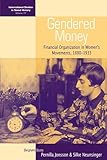Gendered Money : Financial Organization in Women's Movements, 1880-1933 / Pernilla Jonsson, Silke Neunsinger.
Material type: TextSeries: International Studies in Social History ; 17Publisher: New York ; Oxford : Berghahn Books, [2011]Copyright date: ©2011Description: 1 online resource (278 p.)Content type:
TextSeries: International Studies in Social History ; 17Publisher: New York ; Oxford : Berghahn Books, [2011]Copyright date: ©2011Description: 1 online resource (278 p.)Content type: - 9780857452719
- 9780857452726
- Feminism -- Europe -- History
- Feminism -- Sweden -- History
- First-wave feminism -- Sweden
- Socialist feminism -- Sweden -- History
- Women -- Political activity -- Sweden -- History
- Women -- Sweden -- Societies and clubs -- Finance -- History
- SOCIAL SCIENCE / Women's Studies
- Gender Studies and Sexuality, History (General)
- 305.4209485
- online - DeGruyter
| Item type | Current library | Call number | URL | Status | Notes | Barcode | |
|---|---|---|---|---|---|---|---|
 eBook
eBook
|
Biblioteca "Angelicum" Pont. Univ. S.Tommaso d'Aquino Nuvola online | online - DeGruyter (Browse shelf(Opens below)) | Online access | Not for loan (Accesso limitato) | Accesso per gli utenti autorizzati / Access for authorized users | (dgr)9780857452726 |
Frontmatter -- Contents -- List of Figures and Tables -- List of Abbreviations -- List of Swedish Terms -- Acknowledgements -- Introduction Funding Women’s Political Struggle – a Matter of Gender and Class? -- 1 The Fredrika Bremer Association 1884–1925 -- 2 A ‘Bourgeois’ Pioneer’s Purse -- 3 Human Resources in the Fredrika Bremer Association -- 4 Social Democratic Women -- 5 The Price of Turning Women into Socialists -- 6 Human Resources in Social Democratic Women’s Organizations -- Bibliography -- Index
restricted access online access with authorization star
http://purl.org/coar/access_right/c_16ec
As economic citizenship was a pre-condition of full citizenship, the lack of economic autonomy was an important motivation during the early stages of the women’s movement. Independent of their class background, women had less access to not only financial resources but also social and cultural capital, i.e., member’s commitment. Resources are therefore of particular interest from a gender perspective, and this book sheds light on the importance of resources for women’s struggles for political rights. Highlighting the financial strategies of the first wave of Swedish middle-class and socialist women’s movements and comparing them with similar organizations in Germany, England, and Canada, the authors show the importance of class, gender, age, and the national context, offering a valuable contribution to the discussion of resource mobilization theories in the context of social movements.
Mode of access: Internet via World Wide Web.
In English.
Description based on online resource; title from PDF title page (publisher's Web site, viewed 25. Jun 2024)


